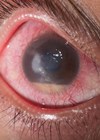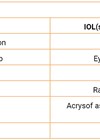Real world data of post-IVT endophthalmitis, from a nurse-delivered intravitreal injection service
Introduction Intravitreal injection of neutralising anti-vascular endothelial growth factor (VEGF) antibody was licenced more than a decade ago, and over the years there has been proportionate increase in the number of intravitreal injections [1]. Injection of a therapeutic agent through...
My ophthalmology taster week experience at Whipps Cross Eye Treatment Centre
Deciding to explore ophthalmology Having read about ophthalmology, I have always found myself fascinated about what a career in ophthalmology entails. I have often wondered what ophthalmologists actually do, as we as medical students did not have a lot of...
The last three patients: general practice (Patient One)
Professor Jonathan Rees is an Emeritus Professor of Dermatology at the University of Edinburgh (2020). He held the Grant Chair of Dermatology in Edinburgh from 2000 to 2020, and before that the Chair of Dermatology in Newcastle from 1992 to...
A life outside ophthalmology
Lloyd Paul Aiello. It was an absolute privilege to speak to Lloyd Paul Aiello, Professor of Ophthalmology, Harvard Medical School, and Vice President of Ophthalmology and Director, Beetham Eye Institute, Joslin Diabetes Center, USA. Prof Aiello is a third-generation ophthalmologist,...
Passing the Refraction Certificate as a Foundation doctor
Application for ophthalmic specialist training (OST) is competitive. This means you should consider making every effort to maximise your portfolio points, as it may have a significant contribution to your OST application ranking. The “Commitment to Specialty” section is the...
My top five ways in which LinkedIn can be useful for ophthalmologists
LinkedIn is the world’s largest professional social networking site, that allows over 830 million users from over 200 countries from a variety of industries to connect. As a result, it is a powerful tool used by professionals to network, collaborate,...
Reflections on designing and delivering an undergraduate ophthalmology teaching programme
Dr Alexander Strother reflects on his time designing and delivering a classroom-based programme to ensure that medical students know how to take comprehensive ophthalmic histories from patients. Working as a clinical teaching fellow, in 2021 I had the great privilege...
Ophthalmology elective: a local experience
Dr Rajan Sondh talks about medical electives and how he believes they are an opportunity to explore career interests, giving undergraduates an opportunity to develop skills in areas that they wouldn’t normally encounter on placements. Typically, electives are taken abroad,...
Ophthalmology history and examination – a guide for medical students
*First author Students have very little exposure to ophthalmology during their years at medical school. Teaching consists of a handful of lectures followed by a short placement in which students are expected to practise histories and examinations on patients with...
Foundation Post in Ophthalmology
If you are in your final year of medicine at university, firstly congratulations on making it so far and secondly, you may be wondering how and which jobs to rank highly. If you have found yourself reading this article, then...
Blame the lens – not its position – in refractive surprise
Aetiology of postoperative refractive surprise Weber coined the term “wrong eye, wrong intraocular lens, wrong patient” in 2008 as an aide memoir of major factors believed to underlie refractive surprise – defined as a significant unintended difference between dioptric refraction...
Harry Moss Traquair: Edinburgh Ophthalmologist and Father Figure of Perimetry
It is a unique honour bestowed upon only a few clinicians, that their name becomes for evermore associated with the subject of their particular expertise and knowledge. Such an individual is undoubtedly Harry Moss Traquair, an Edinburgh-based ophthalmologist, who in...













